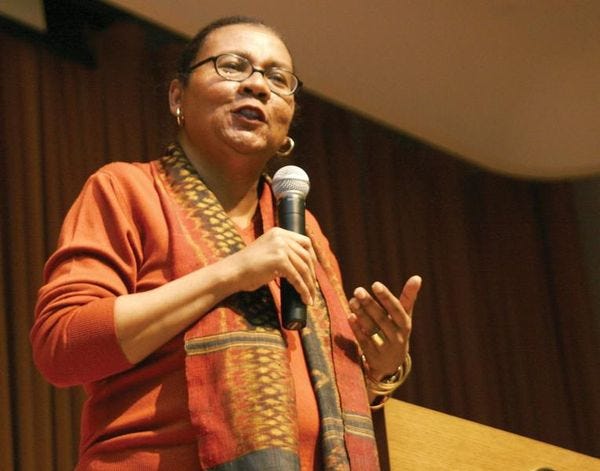Remembering The Visionary bell hooks
Groundbreaking feminist thinker dead at 69.
Whenever great people depart this world, it can feel as if they’ve never left. Their impact is too large and deeply felt. This is the case for bell hooks, who was born Gloria Jean Watkins 69 years ago in Hopkinsville, Kentucky. (Her pen name, which she kept in lowercase, is a tribute to her grandmother.) She passed away Wednesday surrounded by friends and family, which is worth noting especially after the pandemic made us realize how precious a gift that is.
bell hooks wrote about the intersection of race, gender, and capitalism and how this resulted in systems that oppressed and dominated the marginalized. Her definition of feminism was simple but potent — the struggle to end sexist oppression. It was a call to action, not a bumper sticker.
As a child, she originally attended racially segregated schools, which she recalled positively compared to her experience at integrated schools where her teachers and classmates were predominately white. She graduated from Stanford with a BA in English and earned her master’s at the University of Wisconsin-Madison. At 19, she started writing her first book, Ain’t I A Woman: Black Women and Feminism. Published in 1981, the book takes its title from activist Sojourner Truth’s 1851 speech. It’s brilliant, scathing, and confrontational. hooks calls out the racism and misogyny Black women endure, while not sparing white feminist leaders throughout history. She strongly critiques Democrat (and former New York senator) Patrick Moynihan’s offensive theories about Black women, as well as patriarchal misogyny within the Black nationalist movement.
An excerpt from Ain’t I A Woman:
It is obvious that many women have appropriated feminism to serve their own ends, especially those white women who have been at the forefront of the movement; but rather than resigning myself to this appropriation I choose to re-appropriate the term ‘feminism’, to focus on the fact that to be ‘feminist’ in any authentic sense of the term is to want for all people, female and male, liberation from sexist role patterns, domination, and oppression.
hooks would address masculinity directly in her 2004 book We Real Cool: Black Men and Masculinity. She discussed how American society — specifically what she called the “imperialist white supremacist capitalist patriarchy” — criminalized and dehumanized Black men, starting at an early age. It’s especially relevant work within the context of police violence and how Black bodies are considered an inherent threat.
She challenged the impulse to connect material wealth with success or “true” manhood. It concerned her that so much of modern hip hop fell into that trap, and she condemned the misogyny in a lot of hip hop music. hooks often explored the connection between art, culture, and politics. (She was not a fan of The Help nor did she care much for Beyonce’s “Lemonade.”) Her work had an astonishing diversity and breadth, ranging from sociopolitical theory, literary criticism, memoir, and poetry.
From We Real Cool:
As black people in a white-supremacist culture we have had a psychohistory of learning to utterly hide or repress our vulnerability in order to survive. When this survival strategy links with the overall cultural devaluation of vulnerability it makes sense that so many black folks have wrongly interpreted invulnerability as a sign of emotional strength. Maintaining this survival strategy when we no longer have to fear extreme violence at the hands of racist whites has damaged our emotional and intimate bonds. The inability to be vulnerable means that we are unable to feel. If we cannot feel we cannot truly emotionally connect with one another. We cannot know love. No wonder then that the lovelessness that abounds in our culture is even more intense among African-Americans.
Years before Tucker Carlson and Donald Trump, hooks had presciently warned: "When we are taught that safety always lies in sameness, then difference, of any kind, will appear as a threat. When we choose to love we choose to move against fear — against alienation and separation. The choice to love is the choice to connect — to find ourselves in the other."
It’s impossible to overstate her influence on today’s activists for social justice. One of the original Black Lives Matter organizers, Melina Abdullah, a professor of Pan-African Studies at California State Los Angeles, said Wednesday that hooks “changed my life. Shaped me into who I am in so many ways. Thank you, Sister, for your beautiful, powerful, life work and Spirit."
hooks wrote 40 books over her lifetime. She taught at Yale, Oberlin, and the City College of New York before returning to Kentucky in 2004 to teach at Berea College, where she eventually founded the bell hooks Institute.
From Janet Mock’s Redefining Realness: My Path to Womanhood, Identity, Love & So Much More, 2014:
Sometimes people try to destroy you, precisely because they recognize your power — not because they don’t see it, but because they see it and they don’t want it to exist.
hooks appeared frequently on banned book lists. Shipments of her 1995 book Black Looks: Race and Representation were turned away at the Canadian border as possible hate literature. bell hooks is the “critical race theorist” suburban white parents want banned from schools. So let’s stand up against those who either attack “wokeness” directly or as a liability. Let’s fight to keep bell hooks’ voice alive.
[ Reuters / New York Times ]
Follow Stephen Robinson on Twitter.
Do your Amazon shopping through this link, because reasons .
Yr Wonkette is 100 percent ad-free and entirely supported by reader donations. That's you! Please click the clickie, if you are able.



i thought he had retired once upon a time. maybe he should try his luck at that.
Thank you so much for this, Stephen. It would be a great idea if this (thoughtful, informative, analytic, loving) tribute were to become one of articles that Wonkette reruns annually.